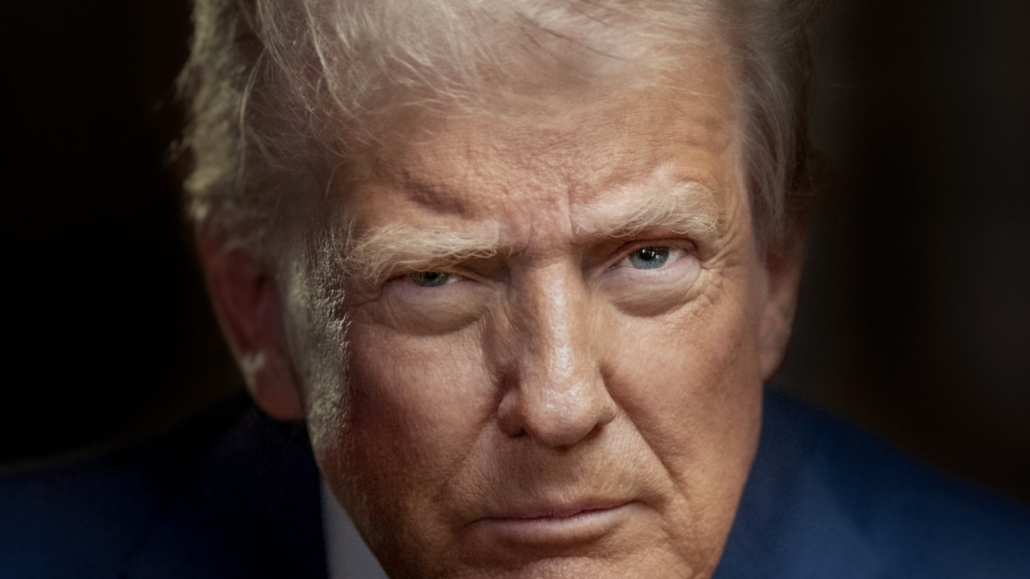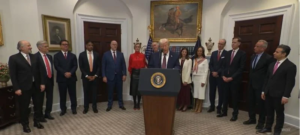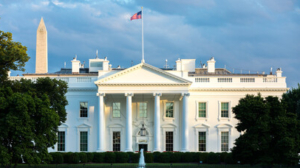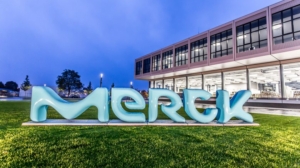
Trump sets 60-day deadline for US pharma price reductions
US President Donald Trump has set a deadline in a letter to the CEOs of the 17 leading Big Pharma companies for the announced reduction of prescription drug prices.
By 29 September, prices in the US biopharma market are expected to be substantially reduced. The top 17 pharmaceutical corporations generated approximately 44% of the global revenue for prescription medicines (Rx) in 2024, amounting to US$753.6bn of the US$1.7tr global market. For foreign companies such as Novartis, Sanofi, GSK, Boehringer Ingelheim and Roche — which face not only the required price cuts but also import tariffs of an estimated 15% or more — the US revenue share typically ranges between 30% and 40%. US-based manufacturers derive more than 60% of their annual revenue from the US market.
Trump had already emphasised in May that US prices for prescription drugs are up to three times higher than in countries with drug price regulation, describing this as unfair when he signed the executive order entitled “Delivering Most-Favored-Nation Prescription Drug Pricing to American Patients”. By the end of his ultimatum, Trump demands a clear commitment from pharmaceutical companies, which are already in discussions with the US administration, that all medicines will be offered in the US only at the lowest international price. He stated that American families must be relieved immediately. While drug prices in Europe are heavily regulated, the US government exerts limited influence over medication pricing, which is why prices there are significantly higher than elsewhere.
Should companies refuse, his administration will “use all available means” to protect the public from “abusive pricing policies”. Trump argued that pharmaceutical firms have profited excessively at the expense of American innovation and must now pay their “fair share”.
The companies affected include Johnson & Johnson (2024 global/US revenue: US$88.8bn/US$50.3bn), Roche (US$65.3bn/US$20–25bn), Merck & Co. (US$64.2bn/US$38–40bn), Pfizer (US$63.6bn/US$40bn), AbbVie (US$56.3bn/US$33–35bn), AstraZeneca (US$54.1bn/US$23.8bn), Novartis (US$50.3bn/US$15–18bn), Bristol Myers Squibb (US$48.3bn/US$30bn), Eli Lilly (US$45bn/US$25–30bn), Sanofi (US$44.5bn/US$13–16bn), Novo Nordisk (US$41.7bn/NA), GSK (US$40.1bn/US$12–14bn), Amgen (US$33.4bn/US$25bn), Boehringer Ingelheim (US$29bn/US$9–11bn), and Gilead Sciences (US$28.8bn/US$18–20bn).
Following Trump’s threat to impose tariffs on pharmaceuticals and raw materials produced abroad, Swiss companies Roche and Novartis announced in April plans to invest US$50bn and US$23bn respectively in US manufacturing facilities by 2030. However, Roche moderated this commitment after Trump’s price reduction campaign, stating that sufficient funds might not be available for US infrastructure investment if prices are cut. Roche’s CEO Thomas Schinecker has since adopted the same argument in negotiations on drug prices. He stated that a 50% price reduction in the US would be feasible if Trump, following his own proposal, allowed trade to bypass pharmaceutical wholesalers in favour of direct sales to pharmacies. However, this faces opposition from the influential Pharmacy Benefit Managers (PBMs), which control around 80% of the US Rx drug market and generate more than US$440bn in revenue. These PBMs, along with pharmaceutical wholesalers, manage the complex tracking and logistics chain for medicines.
Additionally, there remain questions regarding how Trump’s minimum prices (the “Most Favoured Nation” price) will apply to new drugs, which are usually first launched in the US market and thus have no reference price for the lowest international cost.
“The announced introduction of US tariffs amounting to 39% on Swiss products from 7 August 2025 is neither economically nor security-wise justified. The chemical and pharmaceutical industry – a key pillar of Switzerland’s export economy – is also affected,” stated scienceindustries, the business association representing the Swiss chemical, pharmaceutical and life sciences industries. A reversal or softening of the measures is urgently needed. According to study indicators, Switzerland’s pharmaceutical sector is just as productive in terms of drug innovation as the US cluster in Boston.
Update: In the first week of August, Trump announced plans to increase US tariffs on medicines not produced in the US of up to 250%. On CBNC he said: “We’ll be putting initially a small tariff on pharmaceuticals, but in one year—one and a half years maximum—it’s going to go to 150% and then it’s going to go to 250%. We want pharmaceuticals made in our country.” Trump added that the new drug tariff rate would be announced “within the next week of August.”
Midterm reorientation: The combined effects of price capping (MFN) and tariffs reduce the revenue generated by Non-US pharmaceutical companies. The lack of profitability is accelerating a medium-term reorientation of the biopharmaceutical sector towards emerging pharma markets in two distinct ways. Due to the proposed price increases, the US market is losing its previous margin advantage. In addition, the revenues of publicly listed companies are being squeezed by tariffs, reducing both their competitiveness and returns.
In the short term, major pharmaceutical companies can respond by locally manufacturing high-margin products in the US, while biotech firms may grant licences to US partners. In the medium term, a strategic repositioning of drug launch strategies is expected, driven by China’s median six-month faster approval process.
Europe could also benefit as a target market—provided that a reduction in bureaucracy shortens development and approval timelines, and that patent protection for pharmaceutical innovations is extended.
.


 White House
White House Adobe stock photos - Matthew
Adobe stock photos - Matthew  © Merck KGaA
© Merck KGaA